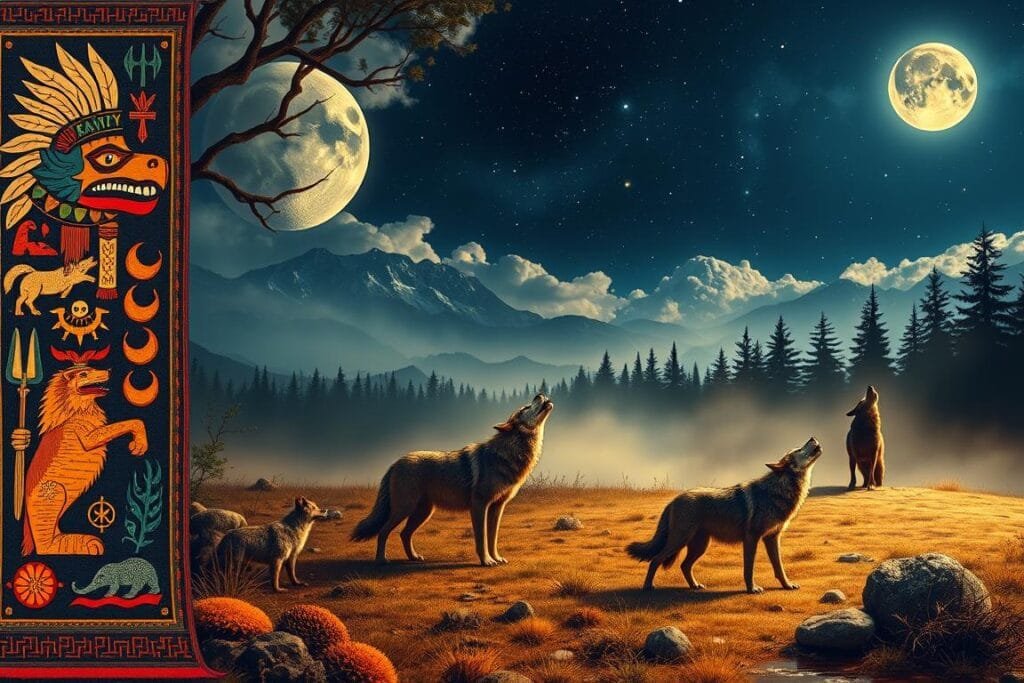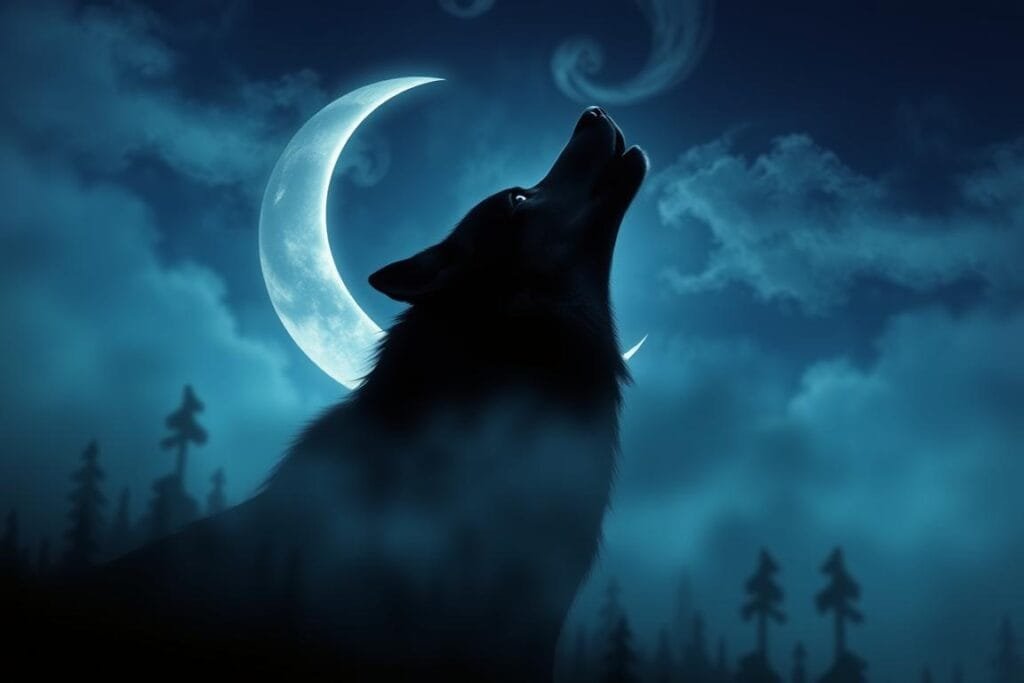Wolves often appear in our subconscious mind as powerful symbols. They can represent both positive and negative aspects of life. Their dual nature makes them fascinating figures in the world of symbolism.
These visions may connect to our primal instincts or emotional states. They can reflect feelings of independence, loyalty, or even fear. Understanding their meaning requires looking deeper into their context.
Across cultures, wolves hold significant meaning. Native American traditions view them as spiritual guides, while Chinese culture associates them with strength and resilience. Experts like Cynthia Richmond and Carl Jung have explored their role in the shadow archetype.
This article will explore key themes, including spiritual guidance, repressed emotions, and cultural interpretations. By the end, you’ll have a clearer understanding of what these visions might mean for you.
Understanding the Symbolism of Wolves in Dreams
The wolf stands as a timeless symbol in human consciousness. It represents primal instincts and the raw emotions tied to survival. These creatures often appear in our subconscious mind, reflecting deeper aspects of our psyche.
Wolves as Symbols of Instinct and Emotion
Wolves are deeply connected to our instincts. They embody the hunting mentality and the drive to survive. This connection can reveal suppressed emotions or unresolved conflicts within us.
Psychologically, they are linked to aggression and repressed impulses. The Jungian shadow archetype suggests that wolves symbolize the parts of ourselves we often hide or deny.
The Dual Nature of Wolf Symbolism
Wolves carry a dual meaning. They can be protectors or predators, depending on the context. This duality reflects the balance between fear and strength in our lives.
Across cultures, they are seen as both guardians and threats. This complexity makes them a powerful symbol in understanding our emotions and instincts.
Spiritual Meanings Behind Dreams About Wolves
In many spiritual traditions, wolves are revered as messengers of deeper truths. They symbolize a bridge between the physical and spiritual realms, offering guidance and protection. Their presence often signifies a call to explore one’s inner wisdom and intuition.
Wolves as Spiritual Guides
In shamanic practices, wolves are seen as powerful allies. They are believed to possess magical powers and act as guides in spiritual development. Their role is to help individuals navigate life’s challenges with courage and clarity.
Native American traditions view wolves as symbols of healing and warrior spirit. They are often associated with family dynamics, representing loyalty and protection. This archetype encourages us to embrace our inner strength and connect with our spirit.
Connection to the Moon and Intuition
The wolf’s link to the moon is deeply rooted in spiritual symbolism. The moon represents cycles, intuition, and the subconscious mind. Wolves, as nocturnal creatures, are thought to aid in spiritual navigation during times of uncertainty.
This connection highlights the importance of trusting one’s instincts. It reminds us to listen to our inner voice and embrace the spiritual energy that guides us. By understanding this bond, we can better interpret the messages conveyed through such visions.
| Symbol | Meaning |
|---|---|
| Shamanic Guide | Spiritual development and protection |
| Moon Connection | Intuition and subconscious guidance |
| Native American Symbolism | Healing, loyalty, and warrior spirit |
Psychological Interpretations of Wolf Dreams
The psychological depth of wolf symbolism reveals much about our inner struggles. These visions often serve as a mirror to our deepest anxieties, reflecting unresolved emotional battles. By analyzing their meaning, we can uncover layers of repressed emotions and hidden fears.
Inner Conflicts and Repressed Emotions
Wolf imagery in the subconscious mind often highlights hidden fears or unresolved conflicts. These creatures symbolize aggression and impulse control, which can manifest in our daily lives. Behavioral therapist Cynthia Richmond suggests that such visions may reveal unacknowledged personality traits.
Common scenarios include social anxiety, relationship fears, or workplace stress. For example, an attack by a wolf might indicate suppressed fears or manipulative individuals in your life. Understanding these symbols can help address inner conflict and emotional balance.
Facing Fears and Hidden Aggressions
Carl Jung’s concept of shadow integration plays a key role here. Wolves often represent the parts of ourselves we deny or suppress. By facing these fears, we can achieve personal growth and emotional clarity.
Richmond’s approach emphasizes confronting fears head-on. This process helps transform hidden aggressions into constructive energy. Whether it’s a howling wolf or a lone figure, these visions encourage us to embrace our true selves.
- Analyze wolf symbolism as a reflection of unacknowledged traits.
- Explore connections between wolf attacks and workplace stress.
- Use Jung’s shadow integration to address repressed emotions.
Cultural Perspectives on Wolf Dreams
Across various cultures, the wolf emerges as a multifaceted symbol, reflecting diverse interpretations and meanings. These interpretations often reveal deep-rooted beliefs and values unique to each society. By exploring these perspectives, we can gain a richer understanding of the wolf dream meaning in different contexts.

Wolf Symbolism in Arabic Culture
In Arabic traditions, the wolf is often associated with deceit and warnings of home invasion. This symbolism stems from the wolf’s predatory nature, which is seen as a threat to safety and security. Such visions may serve as a subconscious alert to protect one’s home or be cautious of deceitful individuals.
This cultural interpretation contrasts sharply with other views, where wolves are seen as protectors or guides. In Arabic culture, the emphasis is on vigilance and awareness, reflecting the community’s focus on safeguarding their environment.
Wolf Dreams in Chinese Tradition
In Chinese culture, the wolf symbolizes danger and betrayal. These visions are often interpreted as signs to prepare for potential threats or confront rivals. The act of killing a wolf in such visions is seen as a triumph over adversaries, highlighting themes of victory and resilience.
This perspective aligns with the Chinese emphasis on strategic thinking and preparedness. It encourages individuals to face challenges head-on and emerge stronger, reflecting the cultural value of perseverance.
Both Arabic and Chinese interpretations offer unique insights into the wolf dream meaning. While Arabic culture focuses on protection and vigilance, Chinese tradition emphasizes readiness and overcoming obstacles. These contrasting views enrich our understanding of the wolf’s symbolic role across cultures.
Common Dreams About Wolves and Their Meanings
The appearance of wolves in our subconscious can carry profound meanings tied to their color. Color symbolism plays a significant role in interpreting these visions, as each hue reflects different aspects of our emotions and experiences. By understanding these colors, we can decode the messages they convey.
Black Wolf Dreams: Shadow and Warning
A black wolf dream often represents the shadow self, a concept tied to hidden fears or suppressed emotions. This vision may signal a need to confront aspects of yourself that you’ve been avoiding. It’s a call to step out of your comfort zone and embrace personal growth.
For example, seeing a black wolf in your subconscious might indicate unresolved conflicts or feelings of vulnerability. Addressing these issues can lead to greater self-awareness and emotional balance.
White Wolf Dreams: Protection and Victory
Dreaming of a white wolf symbolizes protection, enlightenment, and positive energy. This vision often reflects a sense of safety or victory over challenges. It can also represent collective positive energy, reminding you to trust in your inner strength.
Such visions may encourage you to embrace your spiritual side and seek guidance from higher forces. They serve as a reminder that you are supported in your journey.
Red Wolf Dreams: Harmony and Passion
A red wolf in your subconscious signifies harmony, passion, and a deep connection to the earth. This color often reflects intense emotions or a desire for balance in your life. It may also highlight your relationship with the environment or your inner passions.
For instance, encountering a red wolf could symbolize a need to reconnect with nature or pursue your creative instincts. It’s a call to align your actions with your true desires.
- Decode the psychology behind wolf colors to understand their messages.
- Analyze how a black wolf relates to breaking free from comfort zones.
- Explore the white wolf as a symbol of collective positive energy.
- Understand the red wolf’s connection to environmental harmony.
Friendly Wolf Dreams: Companionship and Desire
Encountering a friendly wolf in your subconscious can be both intriguing and symbolic. This vision often represents unacknowledged attraction or a blend of social needs and instinctual behavior. It’s a paradoxical image, as wolves are typically seen as predators, yet here they appear as companions.
Interpreting Friendly Wolf Encounters
A friendly wolf may symbolize hidden desires or sexual urges that you haven’t fully recognized. This vision could reflect a longing for deeper connections or a need to balance social interactions with personal instincts. It’s a reminder to explore what you truly want in relationships.
In workplace dynamics, such visions might highlight the tension between professional roles and personal instincts. Are you suppressing your true self to fit in? This dream could be a call to embrace authenticity.
Freudian interpretations suggest that animal friendships in the subconscious often symbolize repressed emotions. A friendly wolf might represent a part of yourself you’ve been ignoring or denying. It’s an invitation to integrate these aspects into your conscious life.
However, be cautious of the “wolf in sheep’s clothing” metaphor. This vision could also serve as a warning about deceptive individuals in your life. Not everyone who appears friendly has your best interests at heart.
Contrast this with Native American symbolism, where wolves are seen as protectors and guides. In this context, a friendly wolf might signify spiritual support or a call to trust your instincts. It’s a reminder that even in challenging times, you’re not alone.
Dreams of Fighting or Being Attacked by Wolves
Dreams of being attacked by wolves often reflect deep-seated fears and unresolved conflicts. These visions can symbolize hidden anxieties, emotional struggles, or challenges in your waking life. Understanding their meaning requires examining the context and symbolism within the vision.
Wolf attack visions frequently highlight suppression and denial. For example, the location of a bite can indicate specific problem areas. A bite on the hand might symbolize career obstruction, while a bite on the leg could suggest mobility or progress-related issues.
Suppression and Denial in Wolf Attack Dreams
Body positioning during an attack also holds significance. Facing the wolf head-on may represent confronting your fears, while fleeing could indicate avoidance. Pack attacks often symbolize group dynamics, such as workplace conspiracies or social pressures.
Dr. Phil’s dream interpretation strategies emphasize the importance of addressing these visions directly. By analyzing the symbolism, you can uncover hidden fears and work toward resolving them. This approach aligns with Jung’s concept of “devouring transformation,” where confronting fears leads to personal growth.
Overcoming Fear in Wolf Confrontations
Overcoming fear in wolf confrontations requires courage and self-awareness. These visions often serve as a call to face your inner struggles and transform them into strengths. By embracing the lessons they offer, you can achieve emotional clarity and resilience.
| Bite Location | Symbolism |
|---|---|
| Hand | Career obstruction or lack of control |
| Leg | Issues with progress or mobility |
| Neck | Communication challenges or vulnerability |
In summary, wolf attack visions are powerful symbols of fear and conflict. By analyzing their context and symbolism, you can uncover hidden emotions and work toward overcoming your challenges. Whether it’s a single attacker or a pack, these visions encourage you to face your fears and embrace personal growth.
Howling Wolf Dreams: Messages and Warnings
The sound of a howling wolf in your subconscious can carry powerful messages and warnings. These visions often symbolize impending victory or a call for help, depending on the context. Understanding their meaning requires analyzing the details of the vision, such as the pitch and frequency of the howls.

In some interpretations, a howling wolf signifies triumph over adversaries. This can be linked to overcoming challenges in your waking life. For example, a loud, clear howl might represent confidence and success in facing obstacles.
Victory Over Enemies
When a howling wolf appears in your vision, it may symbolize victory over enemies or challenges. This interpretation is often tied to the intensity of the howl. A high-pitched howl could indicate a swift resolution, while a low, prolonged one might suggest a hard-fought battle.
Entertainment Tonight’s dream expert highlights that these visions often reflect personal growth. They encourage you to trust your instincts and embrace the strength needed to overcome difficulties.
Call for Help or Pressure
On the other hand, a howling wolf can also signify a call for help or feelings of pressure. Nighttime howling, in particular, is often associated with detecting conspiracies or hidden threats. This vision may serve as a subconscious alert to stay vigilant.
Tribal interpretations add depth to this symbolism. Many cultures view the wolf’s howl as a form of communication, emphasizing the importance of listening to your inner voice. The moon phase during the vision can also influence its meaning, with a full moon often amplifying the message.
- Analyze the pitch and frequency of howls to decode their meaning.
- Explore connections between moon phases and the intensity of the vision.
- Consider tribal views on wolf communication for a broader perspective.
- Contrast interpretations of victory versus pressure to understand the context.
In summary, a howling wolf in your subconscious can carry dual meanings. It may symbolize triumph over challenges or serve as a warning to address hidden threats. By examining the details, you can uncover the messages these visions hold for you.
Lone Wolf Dreams: Independence and Risk-Taking
A lone wolf in your subconscious often signals a need for self-reliance and bold choices. This imagery celebrates nonconformity, urging you to trust your path even when it diverges from the pack. Whether in careers or personal growth, solitude can symbolize strength.
Interpreting the Lone Wolf Symbol
The lone wolf archetype thrives in entrepreneurship and high-stakes environments. Wall Street’s “lone wolf” traders, for instance, embody calculated risk-taking and self-directed success. Yet, extreme independence may also reflect a shadow aspect—resistance to collaboration.
Contrast this with Native American traditions, where wolves symbolize family unity. Here, the lone wolf challenges communal values, highlighting tensions between individuality and belonging. Your vision might reveal where you lean on this spectrum.
- Career paths: Solo ventures vs. team-driven roles.
- Shadow work: Are you avoiding support systems?
- Cultural lenses: Independence as empowerment or isolation.
Ultimately, a lone wolf vision invites reflection on balance. When does independence fuel growth, and when does it hinder connection? Decode its message to navigate your unique journey.
Wolf Pack Dreams: Family and Group Dynamics
The dynamics of a wolf pack in your subconscious can reveal deep insights into your relationships. These visions often symbolize teamwork, leadership, and the balance between individuality and belonging. Whether in family or workplace settings, pack behavior reflects your role within a group.
In many interpretations, a wolf pack represents unity and shared goals. A peaceful pack often signifies problem resolution and harmony. Conversely, a chaotic pack may highlight conflicts or power struggles within your group dynamics.
Understanding Pack Behavior in Dreams
Observing hierarchy in a wolf pack can mirror your approach to leadership. Are you the alpha, guiding others, or a follower, supporting the group? This vision encourages self-reflection on your role in family or professional teams.
Hunting scenarios in pack visions can serve as metaphors for project management. Just as wolves work together to achieve a goal, these dreams may reflect your ability to collaborate and strategize in your career.
Cultural differences also shape interpretations of pack wolves. In Western traditions, packs symbolize independence and strength. In Eastern cultures, they often represent community and collective success. These contrasting views enrich the symbolism of pack visions.
Oprah’s dream expert highlights the connection between pack behavior and workplace dynamics. A harmonious pack may indicate a supportive team, while a fractured one could signal underlying tensions. Understanding these symbols can improve your professional relationships.
| Pack Behavior | Symbolism |
|---|---|
| Peaceful Pack | Problem resolution and harmony |
| Chaotic Pack | Conflicts or power struggles |
| Hunting Scenarios | Project management and collaboration |
| Cultural Differences | Western independence vs. Eastern community |
In summary, wolf pack visions offer valuable insights into your group dynamics. By analyzing their behavior and symbolism, you can better understand your role in relationships and teamwork. Whether in family or professional settings, these dreams encourage self-awareness and growth.
Dreams of Wolves in Different Colors
The color of a wolf in your subconscious can reveal hidden emotions and deeper meanings. From black to white and even red, each hue carries its own symbolism. Understanding these colors can help decode the messages your subconscious is sending.
Beyond the primary colors, grey and blue wolves also hold significance. Grey often represents mood ambiguity, while blue can symbolize calmness or introspection. Metallic colors like silver and gold are tied to wealth and prosperity, adding another layer to their interpretation.
Black, White, and Red Wolves in Dreams
A black wolf typically symbolizes the shadow self or hidden fears. It may indicate a need to confront suppressed emotions or unresolved conflicts. On the other hand, a white wolf often represents purity, protection, and victory over challenges.
In Chinese culture, the red wolf is a symbol of good fortune and passion. This color reflects intense emotions and a deep connection to life’s energy. Synesthesia, where colors enhance emotional experiences, can also play a role in these visions.
| Color | Symbolism |
|---|---|
| Black | Shadow self, hidden fears |
| White | Purity, protection, victory |
| Red | Passion, good fortune |
| Grey | Mood ambiguity |
| Blue | Calmness, introspection |
Examples from the Los Angeles Times dream column highlight how these colors manifest in real-life interpretations. Whether it’s a black wolf signaling a need for self-reflection or a red wolf encouraging passion, these visions offer valuable insights into your emotional state.
Embracing the Lessons from Dreams About Wolves
Exploring the symbolism of wolves can unlock deeper self-awareness. These visions often serve as opportunities for self-integration, helping us confront hidden aspects of our psyche. By reflecting on the emotions and messages they convey, we can gain valuable insights into our personal growth.
Practical tools like dream journaling can enhance this process. Write down your experiences and connect them to your current life challenges. This practice fosters a deeper understanding of the interpretations behind these powerful symbols.
For added protection and spiritual connection, consider Native American-inspired rituals, such as using dreamcatchers. These practices can help you feel grounded and safe while exploring your subconscious. To dive deeper, explore Norse mythology, which offers rich narratives about the wolf as a guide and protector.
Ultimately, mastering your instincts and trusting your intuition can lead to a more empowered life. Embrace the lessons from these visions and let them guide you toward harmony and clarity. For more on this, visit wolf spirit meaning.







